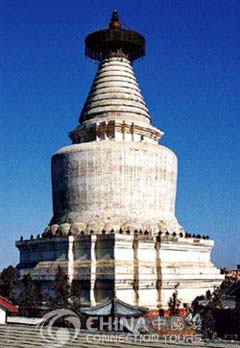
 Beijing White Pagoda Temple (Baita Si) , also known as White Dagoba Temple or White Stupa Temple, is a national major historical and cultural site under state protection. It is located off of Fuchengmennei Dajie in downtown Beijing. The Pagoda is actually only part of the Tibetan Miao Ying Temple, but since it is the temple's most prominent feature, locals name the whole complex after it. The temple is over 700 years old, and was built by the famed Nepalese architect known as Arniger in 1271, during the Yuan Dynasty. The white tower is designed into an integrative architectural style of China and ancient India. The whole tower is 50. 9 meters high, formed with 5 parts, and it took eight years to complete. The tower is surrounded with Tianzheng Hall, Sanshifudian, Qifubaodian and Juliushentongdian. Here once was the most lively temple fair of the capital. This Tibetan Buddhist temple has been closed for repairs for quite some time, but has recently reopened after extensive renovations. There are altogether three Halls in the temple. The first one is and exhibits on the history of the temple, as well as a display of several of the priceless Buddhist treasures that were discovered when the Pagoda was being renovated in 1978. The second Hall is an impressive display called the Hall of 10,000 Buddha. Al-though there are not actually 10,000 statues in the Hall, there are over 7,000 of them, Walking into the Hall is a breathtaking sight, the place is literally covered in Buddha statues on all four walls. Behind this Hall is the Hall of Seven Buddha, which is home to seven large Buddha statues, as opposed to the thousands of little ones. Behind these is the White Pagoda itself. Although visitors are not allowed to go up on the Pagoda itself, there is really not much to go up on, there are no doors leading into the structure.
Beijing White Pagoda Temple (Baita Si) , also known as White Dagoba Temple or White Stupa Temple, is a national major historical and cultural site under state protection. It is located off of Fuchengmennei Dajie in downtown Beijing. The Pagoda is actually only part of the Tibetan Miao Ying Temple, but since it is the temple's most prominent feature, locals name the whole complex after it. The temple is over 700 years old, and was built by the famed Nepalese architect known as Arniger in 1271, during the Yuan Dynasty. The white tower is designed into an integrative architectural style of China and ancient India. The whole tower is 50. 9 meters high, formed with 5 parts, and it took eight years to complete. The tower is surrounded with Tianzheng Hall, Sanshifudian, Qifubaodian and Juliushentongdian. Here once was the most lively temple fair of the capital. This Tibetan Buddhist temple has been closed for repairs for quite some time, but has recently reopened after extensive renovations. There are altogether three Halls in the temple. The first one is and exhibits on the history of the temple, as well as a display of several of the priceless Buddhist treasures that were discovered when the Pagoda was being renovated in 1978. The second Hall is an impressive display called the Hall of 10,000 Buddha. Al-though there are not actually 10,000 statues in the Hall, there are over 7,000 of them, Walking into the Hall is a breathtaking sight, the place is literally covered in Buddha statues on all four walls. Behind this Hall is the Hall of Seven Buddha, which is home to seven large Buddha statues, as opposed to the thousands of little ones. Behind these is the White Pagoda itself. Although visitors are not allowed to go up on the Pagoda itself, there is really not much to go up on, there are no doors leading into the structure.

